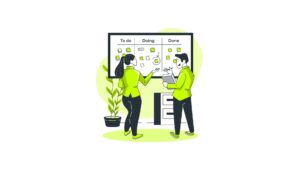Accept Cookies & Privacy Policy?
We use cookies to ensure that we give you the best experience on our website. If you continue to use this site we will assume that you accept and understand our Privacy Policy, and our Terms of Service.
The world of software testing is rapidly evolving, thanks to the advancements in artificial intelligence (AI) and machine learning (ML) technologies. Test automation, in particular, is undergoing significant change as more organizations adopt AI and machine learning-based tools to improve the speed, accuracy, and efficiency of their testing processes.
In this blog post, we will look at how AI and machine learning are transforming software testing, as well as some of the tools that are leading the way. The aim of this post is to bridge the gap between the worlds of test automation and AI/ML.
Applitools is a cloud-based visual testing platform that uses AI and ML to detect and analyze visual changes in applications. Its powerful algorithms can detect even the slightest visual changes, making it an ideal tool for testing applications with a large number of visual components.
Applitools also integrates with popular test automation frameworks such as Selenium, Appium, and Cypress, making it easy to incorporate into existing testing processes. This is also considered one of the most used AI powered Visual Automation tools available in the market.
Accelq is a test automation platform that leverages AI and ML to accelerate the testing process. It uses natural language processing (NLP) to allow testers to write test cases in plain English, which are then automatically converted into automated tests. Accelq also includes an AI-powered test generation engine that can create new tests based on existing test cases, saving testers time and effort.
Automated testing tools with AI and ML capabilities can significantly reduce testing time and resources. They can run tests faster and more frequently, allowing testers to focus on more important tasks.
With the power of Artificial Intelligence now QAs can build stable, scalable, and reusable automated tests. The best three takeaways would be:
While AI and machine learning can improve test accuracy, it is important to remember that they are not perfect. Testers must remain vigilant and thorough in their testing processes, rather than relying solely on the results generated by automated tools.
To summarise, while AI and ML-powered test automation tools have numerous advantages, they also have potential drawbacks. Before deciding to use these tools, businesses, and teams should carefully assess their needs and resources and weigh the pros and cons. Furthermore, it is critical to remember that AI and ML-powered tools should be used to supplement, rather than replace, human testing and oversight.
Since AI/ML-based test automation is new to the market, approaching the sales team would be advantageous in procuring a more realistic pricing model. To make an impact in the early stages, all of the companies listed below are willing to extend the trial version with additional support.
Here is a rough pricing comparison to help you decide whether to use AI/ML powered automation tools.
Tools | Pricing | Free Trial | Source |
Applitool | Flexible Pricing | Yes, lifetime free for 1 user with 100 checkpoints monthly | |
Accelq | There are three types of pricing starting from 150$ per user per month to 440$. [Check the link in the source] | Yes, the trial version can be extended. | |
Testim | Starts from 450$ per month to 1000$. [Check link in the Source] | Yes- 14 days trial | |
Functionize | Flexible Quote based price model. [Check link in the source for Quote] | Yes-14 day trial | |
TestCraft | Subscription plans for both Monthly & Annually, start from 83$. [More details in the source section] | Yes-14 day trial |
Artificial intelligence and machine learning are reshaping the software testing industry. Testers can create and execute tests faster and more accurately with the help of AI and ML-powered test automation tools, improving test coverage and reducing false positives and false negatives.
The five tools mentioned in this article – Applitools, Accelq, Testim, Functionize, and TestCraft – are just a few examples of the many AI and ML-powered test automation tools available in the market. As the use of AI and ML in testing continues to grow, we can expect to see even more innovative tools and solutions emerge in the future.
We are ThoughtFrameworks have the expertise to help your project delivery with the proper use of AI/ML and can be consumed across the enterprise. As we have a large team who has expertise in multiple Test Automation tools and frameworks so we can bring a wide variety of talents to achieve the target.

So picture this: You’re the air traffic controller of a chaotic airport where the planes (developers) don’t always listen, the passengers (stakeholders) want to change destinations mid-flight, and the weather (unforeseen blockers) is always unpredictable.

Imagine a world where testing is no longer a bottleneck. No more endless cycles of manual effort, no more missed defects due to human fatigue, and no more panic at the eleventh hour before a major ERP rollout.

Imagine a world where testing is no longer a bottleneck. No more endless cycles of manual effort, no more missed defects due to human fatigue, and no more panic at the eleventh hour before a major ERP rollout.

Let’s talk about GenAI and testing in 2025—the wild west of technology where machines are not just smart, but scary smart. GenAI (that’s Generative AI for the uninitiated) is running the show everywhere. It’s writing poetry, designing ads, debugging code, and probably plotting to take over my job as I write this blog.

Ah, 2024—you’ve been a year, haven’t you? For us at Thought Frameworks, this year wasn’t just about running the usual QA/QE playbook. Nope, we went full throttle into the future—tinkering, testing, and transforming everything from ERP systems to the ever-evolving world of SAP, GenAI, and security testing.

So, you’re deep in the ERP trenches and trying to figure out the best approach between NetSuite and Oracle EBS. You’re certainly not alone! We can help break down how these two ERP giants stack up when it comes to ensuring systems run like clockwork but without the overload.
Accept Cookies & Privacy Policy?
We use cookies to ensure that we give you the best experience on our website. If you continue to use this site we will assume that you accept and understand our Privacy Policy, and our Terms of Service.
| Cookie | Duration | Description |
|---|---|---|
| cookielawinfo-checkbox-analytics | 11 months | This cookie is set by GDPR Cookie Consent plugin. The cookie is used to store the user consent for the cookies in the category "Analytics". |
| cookielawinfo-checkbox-functional | 11 months | The cookie is set by GDPR cookie consent to record the user consent for the cookies in the category "Functional". |
| cookielawinfo-checkbox-necessary | 11 months | This cookie is set by GDPR Cookie Consent plugin. The cookies is used to store the user consent for the cookies in the category "Necessary". |
| cookielawinfo-checkbox-others | 11 months | This cookie is set by GDPR Cookie Consent plugin. The cookie is used to store the user consent for the cookies in the category "Other. |
| cookielawinfo-checkbox-performance | 11 months | This cookie is set by GDPR Cookie Consent plugin. The cookie is used to store the user consent for the cookies in the category "Performance". |
| viewed_cookie_policy | 11 months | The cookie is set by the GDPR Cookie Consent plugin and is used to store whether or not user has consented to the use of cookies. It does not store any personal data. |
Ready for a Quality Software?
Let’s Dig Deep Into Your Thought!